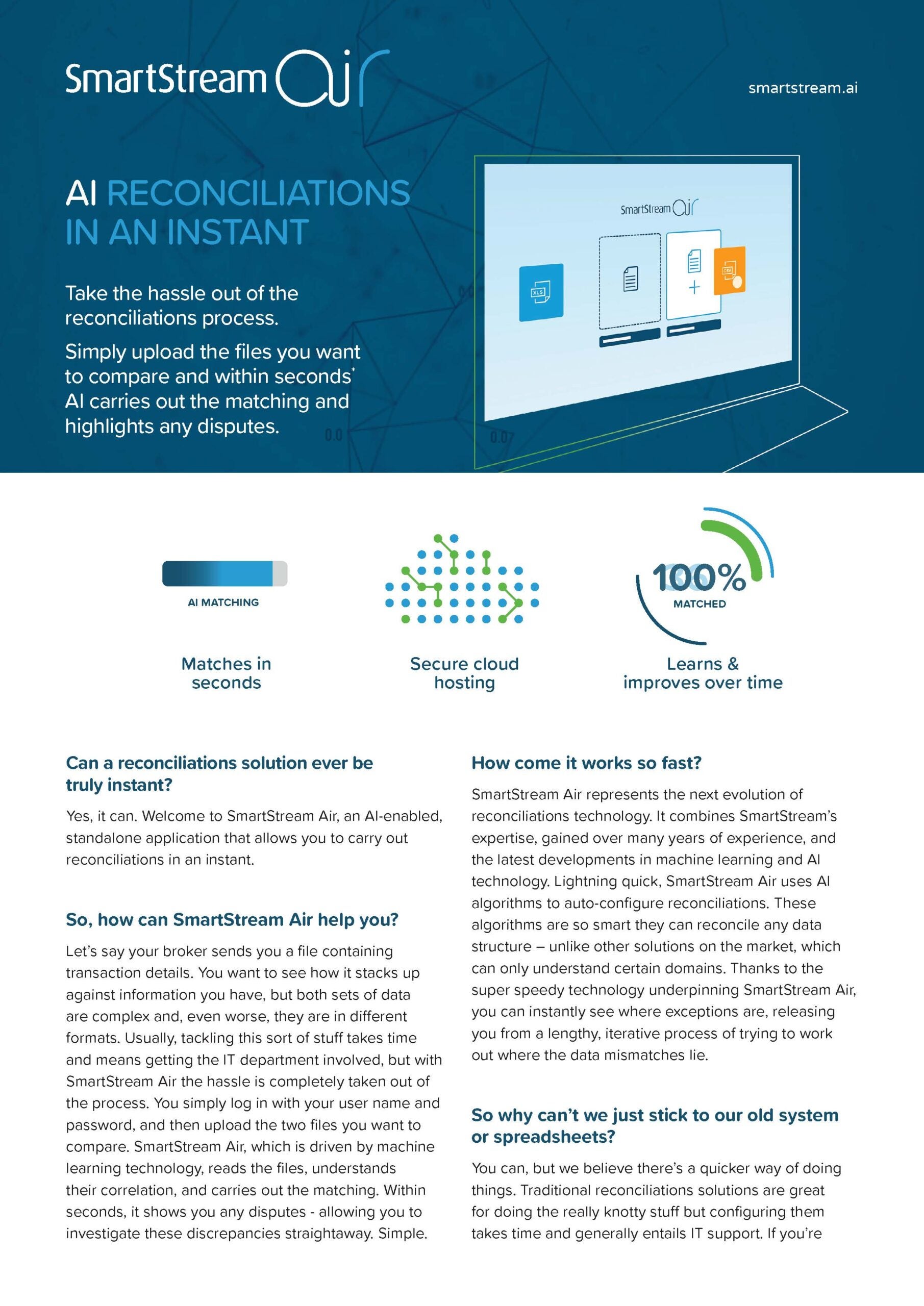

IN ASSOCIATION WITH SMARTSTREAM

Access deeper industry intelligence
Experience unmatched clarity with a single platform that combines unique data, AI, and human expertise.
Helping the financial services industry to keep up in the technology race means software providers need to stay ahead in terms of ideas and infrastructure. SmartStream’s CTO, Darryl Twiggs, talks us through the company’s technology refresh and how it is preparing for the emergence of new tools like blockchain, which will transform the functionality it can deliver to its clients.
The financial services industry relies on technology in every aspect of its operations, so it is under great pressure to keep pace with the latest software tools, to be prepared for what is coming over the horizon.
“Last year, we had a complete refresh of our technical stack,” says Twiggs, “We have done this proactively since 2000, and we do it when new technologies emerge that are sufficiently robust to require it.”
But, explains Twiggs, banks need a quantum leap in efficiency to get to the next level: “They don’t need improvements of 1% or 2%, but 20% or 30%.”

US Tariffs are shifting - will you react or anticipate?
Don’t let policy changes catch you off guard. Stay proactive with real-time data and expert analysis.
By GlobalDataOne goal for the systems refresh SmartStream has undertaken is to give clients a boost toward that leap – solutions that are more intuitive and easier to use, that deliver results faster, and that take away the strain of supporting IT infrastructure in-house. Banks increasingly want to work with software providers that can host applications off-site and keep them up to date with new or improved functionality without disruption.
“Now, there is a big move from on-premise systems to hosted applications, and clients are keen to put data in the cloud or a data lake, or use it for analytics. We used API before but all of our solutions now use Representational State Transfer (REST) to deliver open, Public APIs.
“We looked at the user interface, for instance, which is now built on a system that allows us to refresh or upgrade it with new components with minimal disruption to our clients operations,” remarks Twiggs. “We have a new digital payments system, which we built in six months; the ability to refresh it in our new stack is very appealing.”
The company is now making extensive use of Docker, a set of platform as a service (PaaS) products that can package an application and its dependencies in a virtual container that can run on any Linux server. The advantage of ‘dockerising’ an application is that it provides flexibility and portability, enabling the application to be run in various locations, whether on-premise, or in a private or public cloud.
“All we have to do is point the user to a different Docker container,” Twiggs explains. “That increases cost-efficiency for us and for our clients, and it improves the ability to scale up. It is the first step in moving to a true microservices, cloud-native architecture, which structures an application as a collection of services that are easy to test and maintain, loosely coupled, independently deployable and organised around business capabilities.”
AI is everywhere
A key strand of SmartStream’s technology strategy is the widespread use of AI – but machine-learning algorithms are not being used by the company for novelty’s sake. Though the financial services industry is looking closely at AI – in some cases because it is the latest buzzword in the IT space –SmartStream’s approach is to use it only where it can deliver true value.
Twiggs explains why this approach is the most practical, yet still the most agile, “There is a common misunderstanding about AI. It’s really all about data and understanding its characteristics. AI solves data problems very effectively, delivering efficiency, so we use it at various points in our solutions, such as when a bank takes on an IT project there is usually a large front-end process of data mapping. AI parses the data very quickly and efficiently, so we use it in that application so that we can identify more high-cost processes and find lower-cost solutions.”
An example of this is the company’s recent proof of concept for an AI and machine-learning module that forms part of its TLM Cash and Liquidity Management solution. SmartStream has been working with its clients on profiling and predicting intraday settlement activity, which could give cash-management teams greater visibility into the payment process and help them to more efficiently manage liquidity risk. In this system, AI is helping to forecast when payments will settle.
“We reconcile the data so that settlement can become part of the process. That brings cost reduction and efficiency improvements, and it helps our clients as we move to T-zero or same-day settlement,” Twiggs explains.
Hand in hand with the acceleration of the settlement cycle goes the desire to bring reconciliations from the post-settlement phase into real time. This is one area in which blockchain will have a tremendous impact.
Distributed ledger technology (DLT), also referred to as blockchain, is an idea that has been buzzing around the financial services sector for a while because its fundamental qualities promise great benefits. It provides an immutable ledger of transactions, which offers great transparency to all users of the data. It is a decentralised ledger – a single source of truth – that offers greater security and data integrity, along with a complete audit trail.
“Everyone talks about blockchain but no one knows exactly how it will deliver business advantage,” says Twiggs. “Besides the transparency offered by a decentralised and immutable ledger, we see the advantage in the cost model.”
“In addition, we believe banks are starting to evaluate the advantage of a common data set,” says Twiggs “They use many systems, each with their own unique data formats – settlement systems, the general ledger and many more. With blockchain, there would be one record of the data on which all systems could call.
“When we talk to banks about this, we see a light come on. They understand that it could be a way to get around the spaghetti of system communication. Rather than sending data back and forth, everyone can get to the same transparent distributed ledger at the same time.”
The potential benefits that Twiggs describes have already influenced SmartStream’s technology strategy. As well as implementing AI at key points in all of its products, the company has also made sure that all of its systems can communicate using DLT.
“We are already progressing quickly down the road to where blockchain is part of how banks’ systems communicate and operate,” says Twiggs.
AI Reconciliations in an Instant
The financial services industry relies on technological solutions across all areas of operations, so keeping up with the latest software tools is essential to stay ahead. New technology needs to be more intuitive to use and deliver fast results.
Central to SmartStream’s ethos is ensuring that clients are ready for the future and prepared for the challenges that it may bring. Banks are increasingly demanding to work with software providers that are able to host applications off-site and keep them updated with new functionality without disruption.
This whitepaper outlines how SmartStream is developing banking solutions for the future.

By clicking the “Submit” button above, you accept the Terms & Conditions and acknowledge that your data will be used as described in the SmartStream Privacy Policy
We will also collect and use the information you provide for carefully considered and specific purposes, where we believe we have a legitimate interest in doing so, for example to send you communications about similar products and services we offer. We will always give you an option to opt out of any future communications from us. You can find out more about our legitimate interest activity in our privacy policy here. ‘We’ includes Verdict Media Limited and other GlobalData brands as detailed here.







